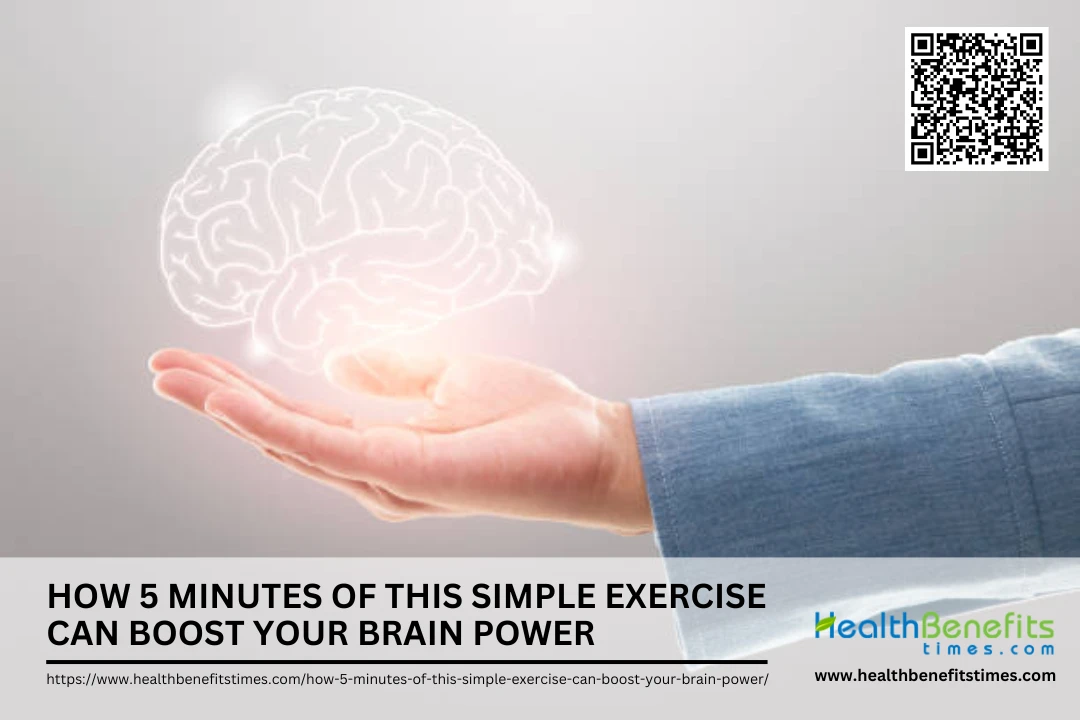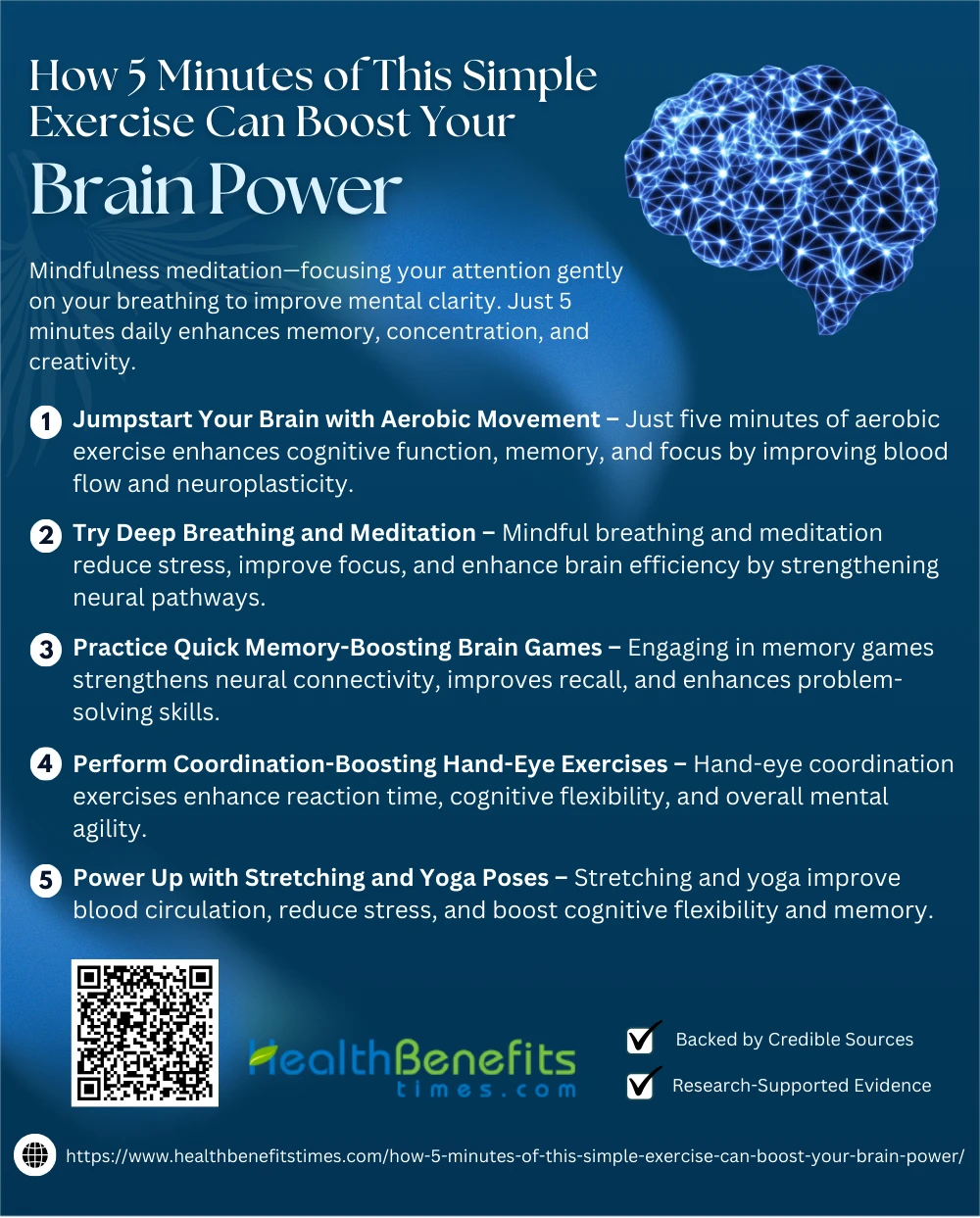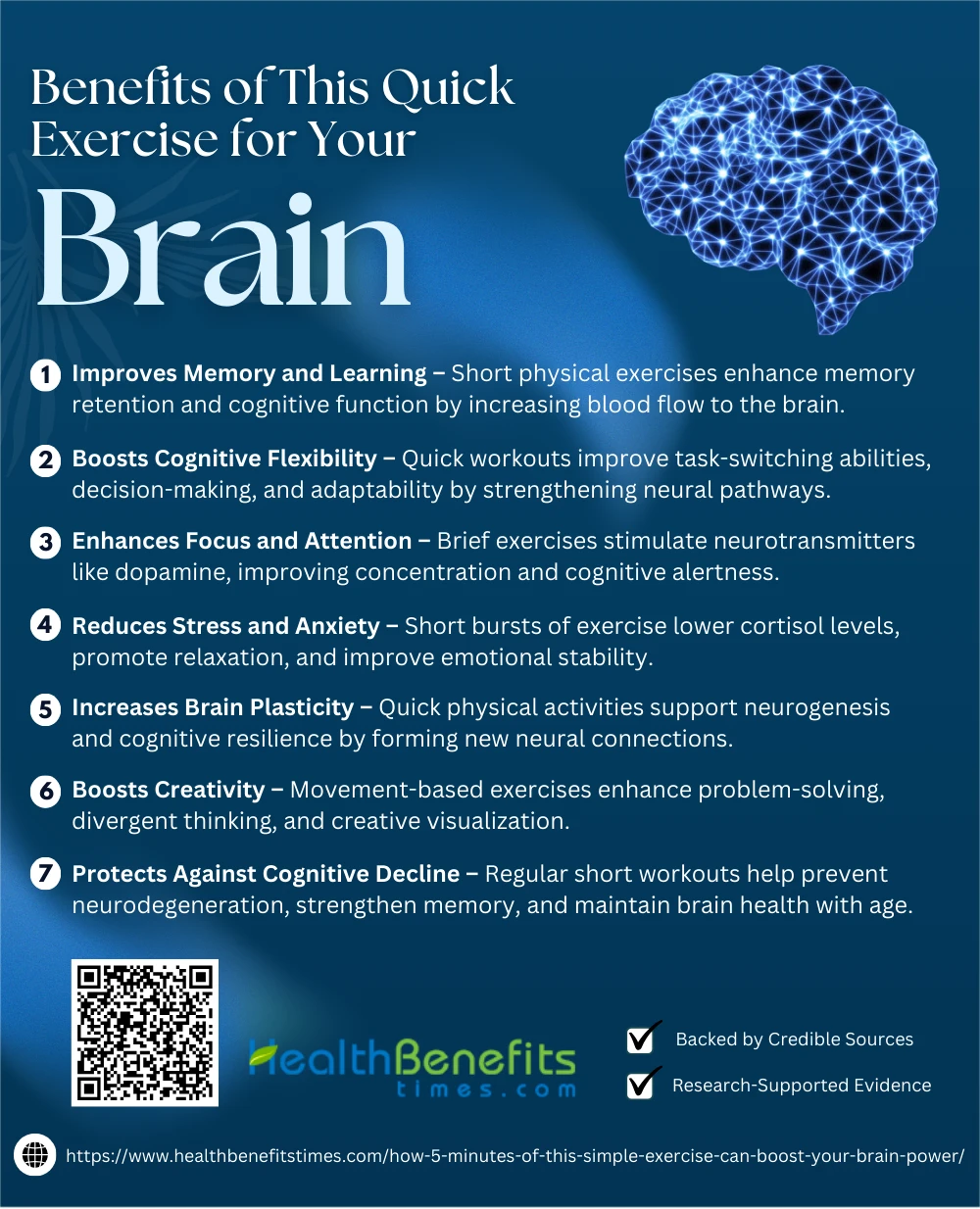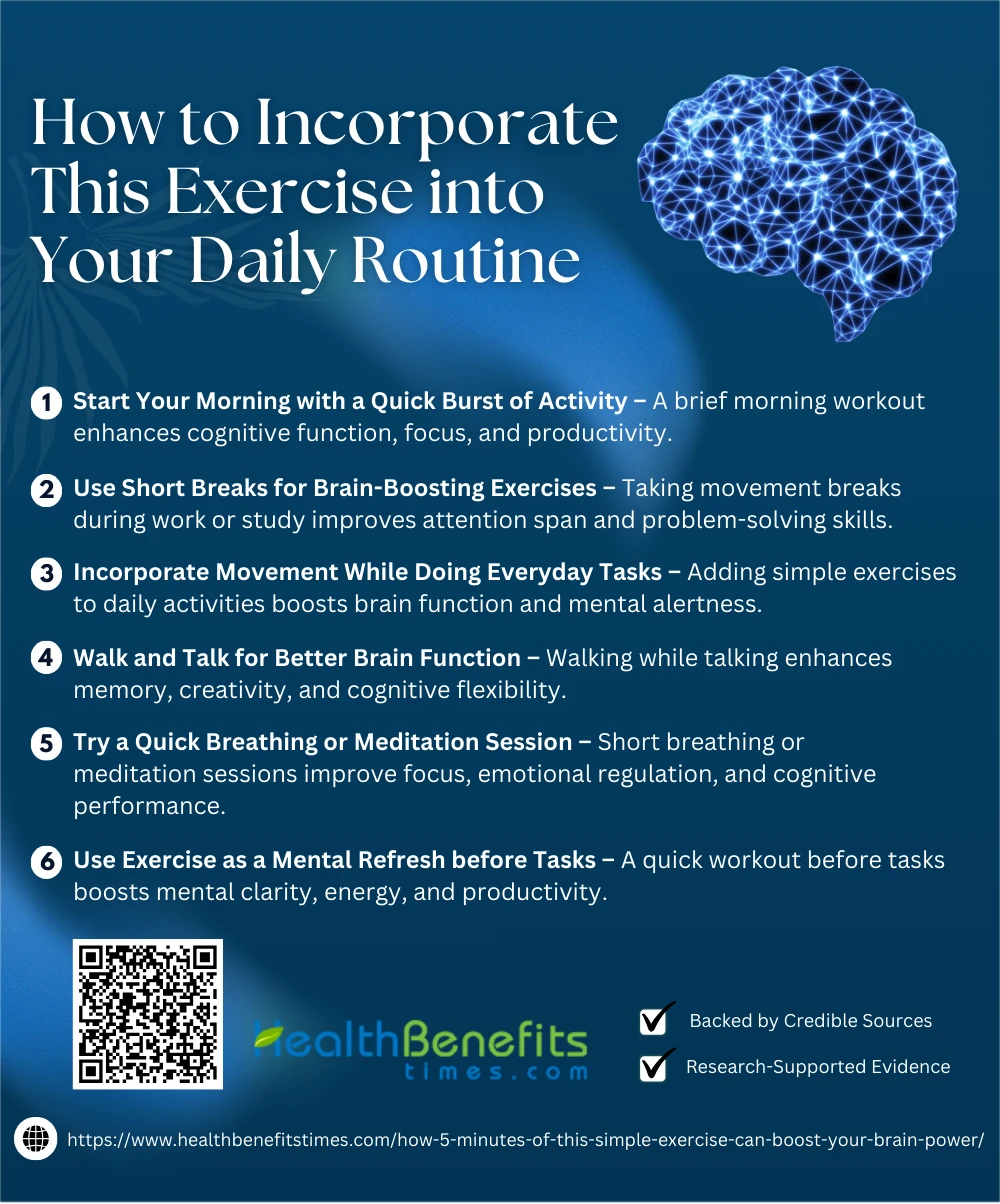- Mindfulness meditation—focusing your attention gently on your breathing to improve mental clarity.
- Just 5 minutes daily enhances memory, concentration, and creativity.
- This quick practice reduces stress, boosting overall brain health instantly.
 Exercise refers to any physical activity that enhances or maintains physical fitness and overall health, including cardiovascular endurance, muscle strength, flexibility, and mental well-being. In today’s fast-paced world, maintaining cognitive function is crucial, and research suggests that even a short burst of exercise can significantly enhance brain power. Studies indicate that engaging in just five minutes of moderate aerobic activity can improve memory, focus, and mental clarity by increasing blood flow to the brain and stimulating neuroplasticity. This brief but effective routine can be seamlessly integrated into daily life, making it an accessible and powerful tool for enhancing cognitive performance.
Exercise refers to any physical activity that enhances or maintains physical fitness and overall health, including cardiovascular endurance, muscle strength, flexibility, and mental well-being. In today’s fast-paced world, maintaining cognitive function is crucial, and research suggests that even a short burst of exercise can significantly enhance brain power. Studies indicate that engaging in just five minutes of moderate aerobic activity can improve memory, focus, and mental clarity by increasing blood flow to the brain and stimulating neuroplasticity. This brief but effective routine can be seamlessly integrated into daily life, making it an accessible and powerful tool for enhancing cognitive performance.
The Science behind Brain Power and Exercise
Exercise plays a crucial role in enhancing cognitive function by increasing neuroplasticity, promoting brain-derived neurotrophic factor (BDNF) production, and improving blood circulation to the brain. Studies indicate that regular physical activity can lead to better memory retention, faster cognitive processing, and reduced risks of neurodegenerative diseases. (1) Additionally, aerobic and resistance exercises have been linked to improved hippocampal function, a critical area for learning and memory. (2)
The 5-Minute Brain-Boosting Exercise
Looking for a quick way to sharpen your mind? Discover how dedicating just five minutes to this simple, science-backed exercise can boost memory, enhance focus, and energize your brain instantly.
1. Jumpstart Your Brain with Aerobic Movement
Engaging in just five minutes of aerobic exercise can significantly improve cognitive function by enhancing neuroplasticity and increasing blood flow to the brain. Research shows that aerobic exercise stimulates the hippocampus, improving memory and learning. (3) Short bursts of physical activity also enhance executive function and reaction time. (4) Additionally, research on exergaming highlights how movement-based activities improve motor coordination and cognitive function. (5) Moderate-intensity aerobic exercise has even been linked to better memory recall and problem-solving skills. (6) Lastly, a study suggests that aerobic workouts improve cognitive flexibility and focus, making it an essential tool for brain health. (7)
2. Try Deep Breathing and Meditation
Deep breathing and meditation enhance cognitive function by reducing stress and increasing oxygen supply to the brain. Studies indicate that mindful breathing practices improve attention span and memory. (8) Yoga and meditation also promote relaxation and improve brain function by modulating neural pathways. (9) Furthermore, deep breathing exercises can enhance mental clarity and reduce anxiety, leading to better cognitive performance. (10) Research also shows that structured meditation enhances focus and improves problem-solving abilities. (11) Lastly, a neurophysiological study found that meditation strengthens synaptic connectivity, enhancing overall brain efficiency. (12)
3. Practice Quick Memory-Boosting Brain Games
Memory-boosting brain games improve cognitive function by enhancing neural connectivity and stimulating different areas of the brain. Research shows that playing memory-enhancing games significantly improves recall ability and attention span. (13) A study found that digital brain games help older adults strengthen memory and delay cognitive decline. (14) Furthermore, interactive memory applications have been shown to aid individuals with mild cognitive impairment. (15) Regular practice of such games also strengthens problem-solving skills and executive functions. (16) Lastly, engaging in brain-training exercises has been linked to improved mental agility and faster information processing (review on brain games and mental agility).
4. Perform Coordination-Boosting Hand-Eye Exercises
Hand-eye coordination exercises stimulate brain function by integrating motor skills with cognitive processes. Studies indicate that such activities improve reaction time and enhance overall cognitive flexibility. (17) Research has also shown that hand-eye coordination training can improve attention and spatial awareness. (18) Additionally, cognitive benefits are observed in older adults who engage in interactive visual-motor training to prevent cognitive decline. (19) Sports-related coordination drills have been linked to improved memory and mental processing speed. (20) Lastly, systematic coordination exercises are found to enhance problem-solving abilities and adaptability in various learning environments. (21)
5. Power Up with Stretching and Yoga Poses
Stretching and yoga improve cognitive function by enhancing blood circulation to the brain, reducing stress, and improving focus. Research shows that yoga and stretching exercises significantly boost memory and executive function. (22) A study found that yoga improves self-reported cognitive function in cancer survivors by reducing mental fatigue. (23) Additionally, stretching has been linked to better neural communication and reduced anxiety. (24) Mind-body exercises such as yoga help stimulate neuroplasticity, enhancing learning capacity. (25) Lastly, research suggests that integrating mindful movements like yoga into daily routines improves attention and cognitive flexibility. (26)
Benefits of This Quick Exercise for Your Brain
Want a sharper mind in just minutes? Learn how this quick, easy exercise can instantly enhance your brain power, improve memory, boost concentration, and reduce stress—all backed by science.
1. Improves Memory and Learning
Engaging in brief physical activities can significantly enhance memory retention and learning abilities. Studies show that quick exercise increases blood flow to the brain, boosting hippocampal function, a key region for memory formation. (27) A study found that even short bursts of movement improve working memory and cognitive recall. (28) Additionally, aerobic activities have been linked to faster information processing and better retention rates. (29) Even post-stroke recovery patients show memory improvement with structured exercise. (30) Lastly, engaging in physical activities such as integrative sports training has been found to stimulate cognitive enhancement in both children and adults. (31)
2. Boosts Cognitive Flexibility
Short exercise sessions have been shown to enhance cognitive flexibility, allowing individuals to switch between tasks more efficiently and make quicker decisions. Research indicates that physical movement improves neural plasticity, supporting better adaptability. (32) Quick reaction-based exercises help in developing flexible thinking patterns, essential for problem-solving and executive functions. (20) A study on sports vision training found that short physical exercises improve visual perception and cognitive switching skills. (20) Additionally, practicing integrative physical movements has been linked to enhanced inhibition control and attention span, leading to better task performance. (27) Lastly, cognitive agility can be strengthened through sports-specific exercises, helping individuals improve their decision-making abilities. (33)
3. Enhances Focus and Attention
Short bursts of exercise significantly improve focus and attention by stimulating dopamine and norepinephrine, which enhance cognitive alertness. Studies show that quick movement-based exercises boost neural processing speed, helping individuals concentrate better. (34) Research also highlights how short workouts improve decision-making skills and sustained focus during tasks. (35) Additionally, a study found that brief physical activity before cognitive tasks improves attention span and working memory. (36) A separate study suggests that eye-tracking technology confirms improved focus after aerobic movement. (37) Lastly, sensory-motor training has been linked to increased cognitive engagement and faster reaction times. (38)
4. Reduces Stress and Anxiety
Short exercises help lower cortisol levels, reducing stress and anxiety effectively. A study found that physical activity activates endorphins, which improve mood and promote relaxation. (39) Research also supports that mindfulness exercises combined with short workouts enhance emotional regulation and resilience. (40) Another study highlights how even 5-minute exercises reduce anxiety symptoms in students and working professionals. (41) Neurophysiological approaches have confirmed that brief exercise sessions improve mental well-being and emotional stability. (42) Lastly, engaging in quick physical activities has been found to significantly alleviate chronic stress and tension. (43)
5. Increases Brain Plasticity
Quick physical exercises have been shown to enhance brain plasticity, allowing the brain to reorganize and form new neural connections. Research indicates that even short aerobic workouts stimulate neurogenesis and synaptic growth. (44) A single session of exercise has been found to increase motor cortical neuroplasticity, improving learning and adaptability. (45) Studies also suggest that physical movement supports cognitive resilience by strengthening neuronal pathways. (46) Additionally, exercise has been linked to hippocampal plasticity, leading to better spatial memory and cognitive flexibility. (47) Lastly, regular short exercises help maintain cognitive health and prevent neurodegeneration, especially in aging populations. (48)
6. Boosts Creativity
Engaging in quick exercises can significantly boost creativity by enhancing divergent thinking and problem-solving abilities. Research shows that short physical activities improve cognitive flexibility, allowing for more innovative thinking. (49) Studies also suggest that physical movement increases oxygenation to the brain, promoting better creative flow. (50) Additionally, consistent exercise has been linked to enhanced problem-solving skills, making individuals more adept at finding novel solutions. (51) Furthermore, sports-based exercises have been found to stimulate complex motor and cognitive coordination, which supports creativity. (52) Lastly, imaginative exercises combined with movement enhance creative visualization and brainstorming capabilities. (53)
7. Protects Against Cognitive Decline
Regular short-duration exercise is an effective strategy for preventing cognitive decline by promoting brain health and resilience. Studies show that physical activity enhances neuroplasticity, helping to maintain cognitive function as individuals age. (41) Additionally, research suggests that quick workouts improve executive function and delay the onset of neurodegenerative diseases. (54) Short bursts of movement have also been linked to slower cognitive deterioration in at-risk populations. (55) Furthermore, physical activity has been identified as a non-pharmacological intervention for dementia prevention, strengthening memory retention. (56) Lastly, even brief exercise sessions have been found to reduce age-related memory loss and boost overall cognitive health. (57)
How to Incorporate This Exercise into Your Daily Routine
Struggling to fit brain-boosting habits into your day? Here’s how to easily incorporate this quick, effective exercise into your routine, enhancing focus, reducing stress, and sharpening your mind consistently.
1. Start Your Morning with a Quick Burst of Activity
Starting your morning with a quick exercise routine can enhance cognitive function and mental clarity. Studies show that even brief morning workouts improve focus and memory by increasing blood circulation to the brain. (10) Additionally, a study found that engaging in short physical activity early in the day leads to better mood and productivity (read about morning exercise benefits).
2. Use Short Breaks for Brain-Boosting Exercises
Taking short exercise breaks during work or study sessions significantly enhances cognitive function and mental energy. Research shows that brief movement intervals improve attention span and information retention. (58) Furthermore, integrating quick physical activity between tasks has been linked to enhanced problem-solving skills and overall brain function. (59)
3. Incorporate Movement While Doing Everyday Tasks
Integrating movement into daily tasks enhances cognitive function and overall health. Research suggests that simple activities like stretching while cooking or doing calf raises while brushing teeth can improve brain function and mental alertness. (55) Additionally, active tasks such as walking meetings or pacing while on calls help boost productivity and focus. (60)
4. Walk and Talk for Better Brain Function
Walking while talking enhances cognitive function, creativity, and problem-solving abilities. Research suggests that combining walking with cognitive tasks significantly improves mental flexibility and memory retention. (61) Additionally, walking meetings or taking short strolls during brainstorming sessions can enhance focus and idea generation. (62)
5. Try a Quick Breathing or Meditation Session
A short breathing or meditation session can enhance cognitive clarity and reduce stress levels. Studies show that mindful breathing exercises improve focus, emotional regulation, and cognitive performance. (39) Additionally, even a 5-minute meditation practice has been linked to improved attention span and neural plasticity. (63)
6. Use Exercise as a Mental Refresh before Tasks
Engaging in a brief physical activity before tasks enhances cognitive function, focus, and efficiency. Research shows that short exercises improve working memory and mental processing speed, making it easier to tackle complex tasks. (64) Additionally, a quick burst of movement before work or study sessions has been found to increase energy levels and cognitive alertness. (65)
Common Misconceptions & Tips for Success
Here are some common misconceptions about short exercises and practical tips for success, supported by research.
1. Misconception: Short Workouts Don’t Make a Difference
Many believe that only long workouts are effective, but research shows that even 5-minute exercises enhance cognitive function and memory retention.
2. Misconception: You Need Equipment for Effective Exercise
People assume that brain-boosting exercises require special equipment, but simple movements like stretching, deep breathing, and walking can improve mental clarity.
3. Misconception: You Must Exercise for Hours for Real Results
Studies show that even a n leading to better focus and reduced stress.
4. Misconception: Exercise Only Benefits Physical Health
Many think exercise only helps the body, but it’s equally powerful for the brain, enhancing problem-solving and decision-making skills.
5. Misconception: You Need a Strict Routine for Exercise to Be Effective
Flexibility in exercise routines can still yield great benefits. Studies suggest that spontaneous movement throughout the day improves mental agility and productivity.
Conclusion
Incorporating just five minutes of mindfulness meditation into your daily routine can significantly boost your brain power, improving memory, sharpening focus, and reducing stress. This simple yet powerful habit doesn’t demand much time, but its benefits are remarkable and immediate. By consistently dedicating these few minutes each day, you’re investing in enhanced mental clarity, emotional resilience, and overall cognitive well-being—transforming your daily life, one mindful moment at a time.





